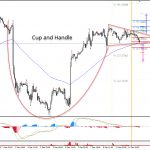The surging yen has been the main feature in the foreign exchange market in recent days, but its advancing streak has been stopped with today’s setback. The greenback traded briefly dipped below JPY107.70 in North America yesterday but has not been below JPY!08 today. It is near JPY109 as NY dealers return to their posts.

Japanese officials may have ratcheted up their rhetoric a notch, but the ultimately it simply seems the yen buying dried up. Either the demand at the beginning of the fiscal year has been met, or sharp yen rise encouraged buyers to pull back. The dollar’s upticks look corrective in nature, and it remains well within yesterday’s range. We peg initial resistance in the JPY109.30 area.
Japan did report a larger than expected February currency account surplus. It rose to JPY2.435 trillion, the most since March 2015, from JPY520 bln in January. The consensus was for a JPY2.032 trillion. To be clear, the driving force was not the trade component. The JPY425.2 bln trade surplus was actually a little smaller than the consensus expected. The investment income surplus was JPY2 trillion.
The previously weak yen did not give much of a boost to the volume of Japanese exports. The impact from the strong yen will probably not be felt acutely on trade, but on the value of the capital flows. The coupons and dividends earned offshore will simply translate into fewer yen. The same is true of Japanese corporate earnings from abroad.
Since the last 1990s, Japanese data indicates that local sales by foreign affiliates of Japanese multinationals have outstripped Japanese exports. Contrary to conventional wisdom, Japan is not an export-oriented economy. Its exports, as a percentage of GDP, roughly in line with US exports, which, proportionately, are less than half of German and Swiss exports, for example.
Given the talk of currency wars, we argue Japanese officials should be commended for having not intervened in the foreign exchange market in the face of the counter-intuitive, and ultimately counter-productive yen appreciation. Given the weak growth prospects and lingering deflationary forces, a tightening of financial conditions is one of the last things Japan’s economy needs.











Leave A Comment